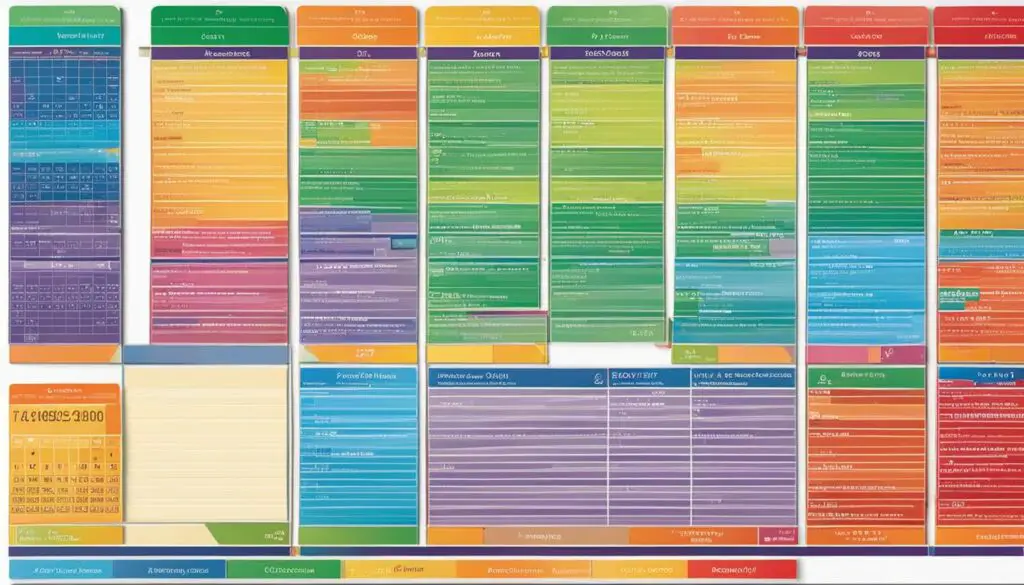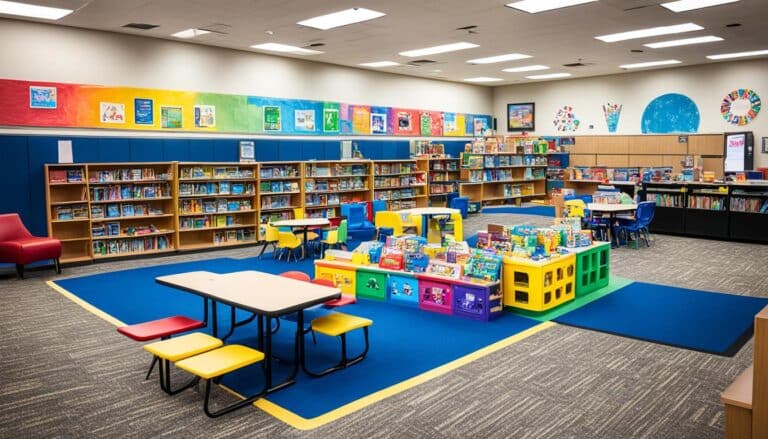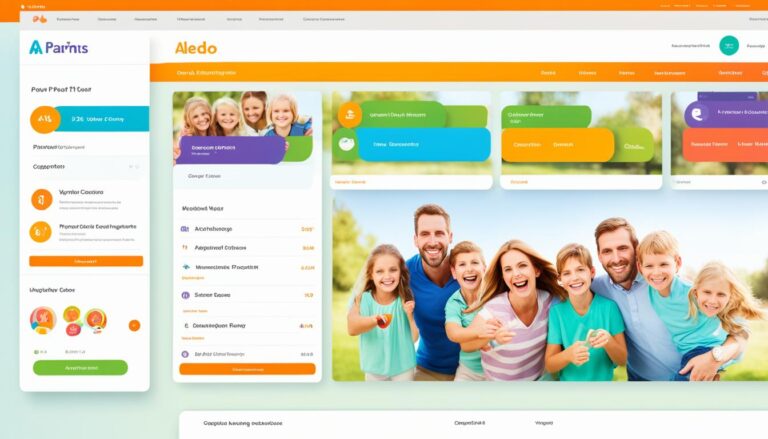Co-Parenting Strategies for Post-Divorce Families
Co-parenting after divorce can be challenging, but with the right strategies in place, it is possible to create a positive and harmonious environment for post-divorce families. When it comes to co-parenting, communication, consistency, and cooperation are key. By focusing on these aspects, parents can navigate the complexities of post-divorce co-parenting and prioritize the well-being of their children.
Key Takeaways:
- Open and clear communication is essential in co-parenting after divorce. Regular and respectful communication with the other parent is crucial for effective co-parenting.
- Creating a consistent co-parenting schedule provides stability and predictability for children. Adhering to the schedule as much as possible helps maintain routine and minimizes stress.
- Fostering a cooperative co-parenting dynamic involves setting aside personal differences and focusing on what is best for the children. Joint decision-making and shared responsibilities contribute to a united front.
- Prioritizing the well-being of the children involves putting their needs first, providing a supportive environment, and maintaining open lines of communication.
- Seeking professional support, such as co-parenting therapy or counseling, can be beneficial for parents and children, helping navigate challenges and improve communication.
Establish Open and Clear Communication
In order to successfully navigate co-parenting after a divorce, open and clear communication is paramount. It is essential to maintain regular and respectful communication with the other parent, ensuring that important information about the children is shared effectively. By being responsive to each other’s concerns and needs, parents can foster an environment of cooperation and understanding.
To facilitate ongoing communication, it is crucial to establish effective channels of communication. Phone calls, emails, and co-parenting apps can serve as valuable tools for staying connected and coordinating parenting responsibilities. These platforms provide a convenient and accessible means of sharing updates, discussing schedules, and addressing any issues that may arise.
Effective communication lays the foundation for successful co-parenting. By promoting open and clear lines of communication, parents can work together to prioritize the well-being of their children and maintain a harmonious co-parenting relationship.
With open communication, parents can discuss important matters such as the children’s education, medical needs, extracurricular activities, and emotional well-being. By involving both parents in decision-making and ensuring that each parent is informed, children can feel supported and have a sense of stability in their post-divorce lives.
Clear communication also helps to minimize misunderstandings and potential conflict. By expressing thoughts, concerns, and expectations in a respectful manner, parents can prevent unnecessary tension and work towards resolving any disagreements that may arise.
Establishing open and clear communication sets the stage for effective co-parenting and promotes a healthy and supportive environment for the children. By consistently prioritizing communication and maintaining a cooperative mindset, parents can lay a solid foundation for their co-parenting journey.
Key Points:
- Open and clear communication is essential for successful co-parenting after divorce.
- Regular and respectful communication with the other parent promotes cooperation and understanding.
- Establishing effective channels of communication, such as phone calls, emails, or co-parenting apps, facilitates ongoing communication.
- Discussion of important matters, involvement in decision-making, and staying informed create a supportive environment for children.
- Clear communication minimizes misunderstandings and conflict, fostering a harmonious co-parenting relationship.
Create a Consistent Co-Parenting Schedule
Creating a consistent co-parenting schedule is crucial in providing stability and predictability for children. It helps them feel secure and know what to expect, even in the midst of a major life transition like divorce.
When establishing the co-parenting schedule, it’s important to consider the parenting time for each parent. This includes weekdays, weekends, holidays, and vacations. By outlining specific dates and times, both parents can have a clear understanding of when they will have valuable parenting time with their children.
While flexibility is key, sticking to the agreed-upon schedule as much as possible is important for maintaining routine and minimizing stress for the children. This consistency allows them to adapt and adjust more easily to the changes in their family dynamic.
Here’s an example of how a co-parenting schedule could be structured:
| Weekdays | Weekends | Holidays | Vacations |
|---|---|---|---|
| Monday, Wednesday, Friday – Parent A | Alternate weekends – Parent B | Alternate holidays | Shared vacations |
| Tuesday, Thursday – Parent B |
Remember, the co-parenting schedule should be flexible enough to accommodate changes when necessary, such as work-related commitments or special occasions. However, it’s important to prioritize the consistency and predictability that a schedule provides for the children.
The ultimate goal of a co-parenting schedule is to ensure that both parents have ample time with their children while also maintaining stability, routine, and a sense of security for the children. By creating a consistent co-parenting schedule, parents can navigate the complexities of co-parenting after divorce with minimal disruption to their children’s lives.

Foster a Cooperative Co-Parenting Dynamic
Developing a cooperative co-parenting dynamic involves working together as a team, setting aside personal differences or conflicts, and focusing on what is best for the children. By fostering a cooperative approach, children can see that their parents are united in their love and support.
Successful co-parenting requires teamwork and shared responsibilities. It is essential to make joint decisions regarding major issues that affect the children’s lives. This includes decisions about their education, healthcare, and extracurricular activities. By involving both parents in the decision-making process, you can ensure that the children’s best interests are always taken into account.
Consistency is key in a cooperative co-parenting dynamic. Rules and discipline should be consistently applied in both households to provide a stable and predictable environment for the children. When parents are on the same page when it comes to rules, expectations, and consequences, it reduces confusion and helps the children understand the boundaries.
“Cooperative co-parenting requires open communication, compromise, and flexibility.”
In addition to decision-making and consistency, sharing responsibilities is an important aspect of cooperative co-parenting. Dividing tasks such as attending school events, extracurricular activities, and medical appointments ensures that both parents play an active role in their children’s lives. By sharing responsibilities, you can create a sense of balance and demonstrate to the children that both parents are equally invested in their well-being.
To foster a cooperative co-parenting dynamic:
- Communicate openly and respectfully with the other parent.
- Make joint decisions regarding major issues.
- Maintain consistency in rules and discipline.
- Share responsibilities for school events, extracurricular activities, and healthcare decisions.
Implementing these strategies will help create a positive co-parenting environment based on teamwork, shared responsibilities, and the common goal of providing the best possible upbringing for your children.
| Benefits of a Cooperative Co-Parenting Dynamic | Benefits of a Non-Cooperative Co-Parenting Dynamic |
|---|---|
|
|
Prioritize the Well-being of the Children
When it comes to co-parenting after divorce, the well-being of the children should always be the top priority. Putting aside personal emotions and conflicts, it is essential to focus on what is best for the children’s emotional, physical, and developmental needs.
A supportive and nurturing environment plays a crucial role in ensuring the well-being of the children. This involves creating a safe space where they feel loved, valued, and understood. By providing consistent support, parents can address their children’s emotional needs and help them navigate the challenges that come with divorce.
Maintaining a consistent routine is also important for the well-being of children. A predictable schedule provides stability amidst the changes and transitions that may arise. It allows children to feel a sense of security and helps them understand their roles and responsibilities within the co-parenting arrangement.
Open lines of communication between both parents and the children are vital for addressing their needs effectively. By actively listening and engaging in open conversations, parents can create an environment where their children feel comfortable expressing their thoughts and feelings. This allows parents to better understand their children’s needs and provide the necessary support.
“By prioritizing the well-being of the children, we can create a nurturing environment that supports their growth and development. This requires putting aside personal differences and focusing on what is truly important – the happiness and welfare of our children.”
Co-parenting support is also crucial in ensuring the well-being of the children. Seeking professional guidance and assistance can provide valuable insights, strategies, and resources to navigate the complexities of co-parenting. It offers an opportunity for parents to learn effective communication techniques, resolve conflicts, and address any concerns that may arise.

| Ways to Prioritize the Well-being of the Children | Benefits |
|---|---|
| 1. Create a supportive and nurturing environment | – Promotes emotional well-being |
| 2. Maintain a consistent routine | – Provides stability and security |
| 3. Foster open lines of communication | – Enables effective understanding and support |
| 4. Seek co-parenting support when needed | – Offers valuable guidance and resources |
Seek Professional Support when Necessary
Co-parenting after divorce can be challenging, and I understand that occasionally, additional professional support may be needed. Seeking the assistance of a co-parenting therapist or counselor can provide valuable tools and strategies to navigate difficult situations, improve communication, and address any emotional or psychological challenges that may arise.
Co-parenting therapy offers a safe and supportive environment where both parents can express their feelings and concerns openly. By engaging in therapy or counseling, parents can gain a deeper understanding of their own emotions and perspectives, as well as those of their children.
Co-parenting therapists or counselors are experienced professionals who specialize in helping divorced parents navigate the complexities of co-parenting. They can assist in developing effective strategies for cooperative parenting, managing conflict, and fostering open communication between both parents.
The Benefits of Co-Parenting Therapy
Co-parenting therapy provides numerous benefits for parents and children alike. Here are a few key advantages:
- Improved communication: Therapists can facilitate productive and respectful communication, helping parents navigate challenging conversations and find common ground.
- Tools and strategies: Co-parenting therapists can provide practical tools and techniques to manage conflict, promote effective problem-solving, and establish healthy boundaries.
- Emotional support: Divorce and co-parenting can be emotionally taxing. Co-parenting therapy offers a supportive space for parents to process their feelings, reduce stress, and find coping mechanisms.
- Child-focused perspective: Co-parenting therapists prioritize the well-being of the children, helping parents better understand their needs and navigate parenting challenges in ways that support their healthy development.
When to Consider Co-Parenting Therapy
While every co-parenting situation is unique, there are certain circumstances where seeking professional support is particularly beneficial. Consider co-parenting therapy if:
- You and your co-parent experience significant conflict or struggle to communicate effectively.
- Your children’s well-being is being negatively affected by the co-parenting dynamic.
- There are major differences in parenting styles and difficulty establishing consistent rules between households.
- You or your co-parent would benefit from emotional support or guidance during the co-parenting journey.
- You are facing complex issues such as introducing a new partner, blended families, or coping with the aftermath of a high-conflict divorce.
Remember, seeking professional support is not a sign of weakness, but rather a proactive step towards ensuring the well-being of everyone involved. By engaging in co-parenting therapy or counseling, you can enhance your co-parenting relationship, promote harmony within your family, and provide a nurturing environment for your children to thrive.
| Benefits of Co-Parenting Therapy | When to Consider Co-Parenting Therapy |
|---|---|
| Improved communication | You and your co-parent experience significant conflict or struggle to communicate effectively. |
| Tools and strategies | Your children’s well-being is being negatively affected by the co-parenting dynamic. |
| Emotional support | There are major differences in parenting styles and difficulty establishing consistent rules between households. |
| Child-focused perspective | You or your co-parent would benefit from emotional support or guidance during the co-parenting journey. |
| You are facing complex issues such as introducing a new partner, blended families, or coping with the aftermath of a high-conflict divorce. |
Conclusion
Successfully co-parenting after divorce requires dedication and the implementation of effective strategies. By prioritizing open communication, creating a consistent schedule, fostering a cooperative dynamic, and prioritizing the well-being of the children, parents can navigate the challenges of co-parenting and achieve post-divorce harmony.
Establishing open communication channels with the other parent allows for regular and respectful dialogue, which is essential for making joint decisions and addressing concerns. Creating a consistent co-parenting schedule provides stability and predictability for children, ensuring they feel secure and well-cared for.
A cooperative co-parenting dynamic involves working together as a team, setting aside personal differences, and focusing on the best interests of the children. By sharing responsibilities and maintaining consistency in rules and discipline, parents can create a supportive and harmonious environment for their children.
Prioritizing the well-being of the children is vital. This means putting their emotional, physical, and developmental needs first, and seeking professional support when necessary. Co-parenting therapy or counseling can provide valuable tools and strategies to navigate challenging situations and improve communication.
By implementing these co-parenting strategies, parents can create a positive and supportive environment for their children. With dedication and collaboration, successful co-parenting and post-divorce harmony are achievable goals, ensuring the best outcomes for the entire family.
FAQ
What are some strategies for successful co-parenting after divorce?
Some strategies for successful co-parenting after divorce include open and clear communication, creating a consistent co-parenting schedule, fostering a cooperative co-parenting dynamic, prioritizing the well-being of the children, and seeking professional support when necessary.
How important is open and clear communication in co-parenting after divorce?
Open and clear communication is essential for successful co-parenting after divorce. It involves regular and respectful communication with the other parent, sharing important information about the children, and being responsive to each other’s concerns and needs.
Why is it important to create a consistent co-parenting schedule?
Creating a consistent co-parenting schedule provides stability and predictability for children. It outlines parenting time for each parent, including weekdays, weekends, holidays, and vacations. Adhering to the schedule as much as possible helps maintain routine and minimize stress for the children.
How can co-parents foster a cooperative co-parenting dynamic?
Co-parents can foster a cooperative co-parenting dynamic by working together as a team, setting aside personal differences or conflicts, and focusing on what is best for the children. This includes making joint decisions, maintaining consistency in rules and discipline, and sharing responsibilities.
Why is it important to prioritize the well-being of the children in co-parenting after divorce?
Prioritizing the well-being of the children is crucial in co-parenting after divorce. It means putting aside personal emotions or conflicts and focusing on what is best for the children’s emotional, physical, and developmental needs. Providing support, maintaining routine, and ensuring open communication are vital for their well-being.
When is seeking professional support recommended in co-parenting after divorce?
Seeking professional support, such as co-parenting therapy or counseling, is recommended when co-parents face challenges in communication, emotional well-being, or conflicts that affect the children. Professional support provides tools and strategies to navigate difficult situations, improve communication, and address emotional or psychological challenges.






